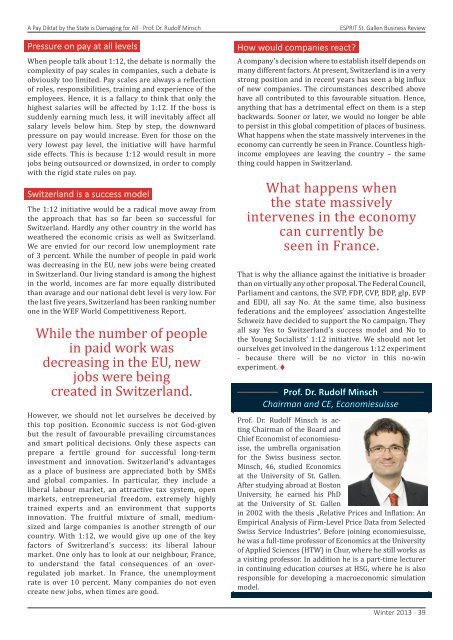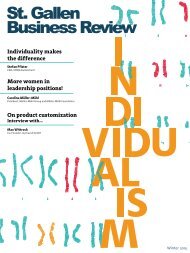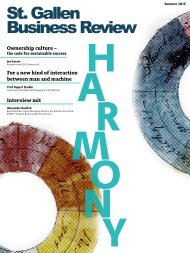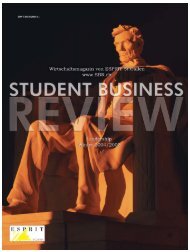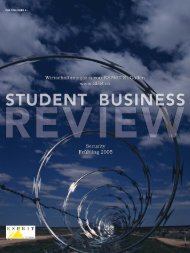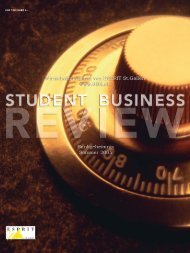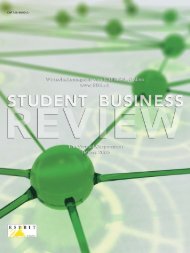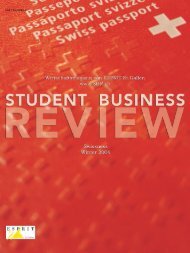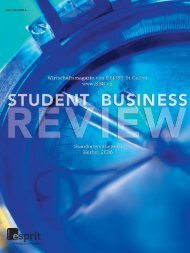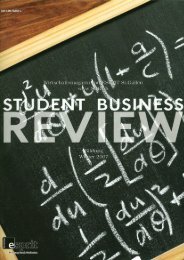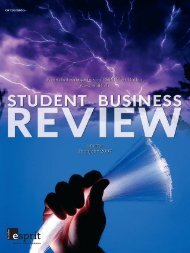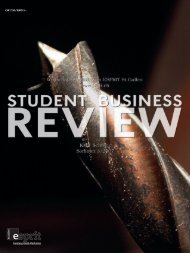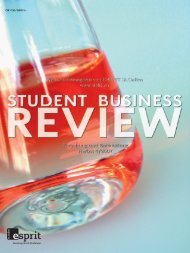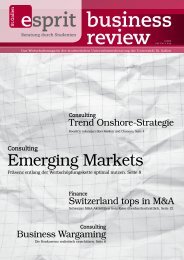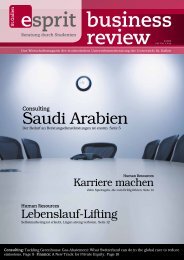Role Models & Responsibility
St. Gallen Business Review Winter 2013
St. Gallen Business Review
Winter 2013
You also want an ePaper? Increase the reach of your titles
YUMPU automatically turns print PDFs into web optimized ePapers that Google loves.
A Pay Diktat by the State is Damaging for All - Prof. Dr. Rudolf Minsch<br />
<br />
When people talk about 1:12, the debate is normally the<br />
complexity of pay scales in companies, such a debate is<br />
obviously too limited. Pay scales are always a reflection<br />
of roles, responsibilities, training and experience of the<br />
employees. Hence, it is a fallacy to think that only the<br />
highest salaries will be affected by 1:12. If the boss is<br />
suddenly earning much less, it will inevitably affect all<br />
salary levels below him. Step by step, the downward<br />
pressure on pay would increase. Even for those on the<br />
very lowest pay level, the initiative will have harmful<br />
side effects. This is because 1:12 would result in more<br />
jobs being outsourced or downsized, in order to comply<br />
with the rigid state rules on pay.<br />
<br />
The 1:12 initiative would be a radical move away from<br />
the approach that has so far been so successful for<br />
Switzerland. Hardly any other country in the world has<br />
weathered the economic crisis as well as Switzerland.<br />
We are envied for our record low unemployment rate<br />
of 3 percent. While the number of people in paid work<br />
was decreasing in the EU, new jobs were being created<br />
in Switzerland. Our living standard is among the highest<br />
in the world, incomes are far more equally distributed<br />
<br />
the last five years, Switzerland has been ranking number<br />
<br />
While the number of people<br />
in paid work was<br />
decreasing in the EU, new<br />
jobs were being<br />
created in Switzerland.<br />
However, we should not let ourselves be deceived by<br />
this top position. Economic success is not God-given<br />
but the result of favourable prevailing circumstances<br />
and smart political decisions. Only these aspects can<br />
prepare a fertile ground for successful long-term<br />
investment and innovation. Switzerland’s advantages<br />
as a place of business are appreciated both by SMEs<br />
and global companies. In particular, they include a<br />
liberal labour market, an attractive tax system, open<br />
markets, entrepreneurial freedom, extremely highly<br />
trained experts and an environment that supports<br />
innovation. The fruitful mixture of small, mediumsized<br />
and large companies is another strength of our<br />
country. With 1:12, we would give up one of the key<br />
<br />
<br />
to understand the fatal consequences of an over-<br />
<br />
rate is over 10 percent. Many companies do not even<br />
create new jobs, when times are good.<br />
<br />
ESPRIT St. Gallen Business Review<br />
on<br />
many different factors. At present, Switzerland is in a very<br />
<br />
of new companies. The circumstances described above<br />
have all contributed to this favourable situation. Hence,<br />
anything that has a detrimental effect on them is a step<br />
backwards. Sooner or later, we would no longer be able<br />
to persist in this global competition of places of business.<br />
What happens when the state massively intervenes in the<br />
<br />
income employees are leaving the country – the same<br />
thing could happen in Switzerland.<br />
What happens when<br />
the state massively<br />
intervenes in the economy<br />
can currently be<br />
<br />
That is why the alliance against the initiative is broader<br />
<br />
<br />
and EDU, all say No. At the same time, also business<br />
<br />
Schweiz have decided to support the No campaign. They<br />
<br />
the Young Socialists’ 1:12 initiative. We should not let<br />
ourselves get involved in the dangerous 1:12 experiment<br />
- because there will be no victor in this no-win<br />
experiment. <br />
<br />
Chairman and CE, Economiesuisse<br />
Prof. Dr. Rudolf Minsch is acting<br />
Chairman of the Board and<br />
Chief Economist of economiesuisse,<br />
the umbrella organisation<br />
for the Swiss business sector.<br />
Minsch, 46, studied Economics<br />
at the University of St. Gallen.<br />
After studying abroad at Boston<br />
University, he earned his PhD<br />
at the University of St. Gallen<br />
<br />
<br />
Swiss Service Industries“. Before joining economiesuisse,<br />
he was a full-time professor of Economics at the University<br />
of Applied Sciences (HTW) in Chur, where he still works as<br />
a visiting professor. In addition he is a part-time lecturer<br />
in continuing education courses at HSG, where he is also<br />
responsible for developing a macroeconomic simulation<br />
model.<br />
Winter 2013 - 39


